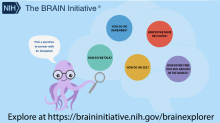
The BRAIN Initiative has recently launched two projects for high school students, a web-based, interactive, educational experience called the BRAIN Explorer and the BRAIN Initiative Challenge, an essay and video contest for high school students.
In response to the BRAIN 2.0 report, the NIH BRAIN Initiative has been developing new ways to increase public engagement in the Initiative, with a focus on engaging high school students in order to develop the next generation of researchers. Recently, the BRAIN Initiative has launched two projects, the BRAIN Explorer and the BRAIN Initiative Challenge.
BRAIN Explorer: A Web-based Activity for High Schoolers
The NIH has created a web-based, interactive, educational experience called the BRAIN Explorer to inspire high school-aged students to learn about neuroscience through the investigation of BRAIN Initiative science.
In the BRAIN Explorer, students help Dr. Octowise explore five basic questions about the brain, including how we use our brains to see, talk, and remember. After clicking on a question, students are asked to choose experiments to complete with Dr. Octowise to uncover scientific discoveries from NIH BRAIN Initiative scientists. The discoveries are described at a high school-level with images, videos, and real data from scientific publications. The activity also includes a BRAIN dictionary to define words and phrases that might be confusing to students. Users can also help us improve the activity by offering feedback at the end.
Explore the Brain Explorer at or learn more about the activity on YouTube!
***
BRAIN Initiative Challenge: Considering Ethics During Brain Technology Development
The NIH BRAIN Initiative is holding an essay and video contest for high school students on the neuroethical considerations of using cutting-edge brain technologies. We welcome your help in spreading the word and encouraging students to join. The BRAIN Initiative Challenge: Considering Ethics During Brain Technology Development is seeking creative essays or videos from currently enrolled U.S. high school students that describe a teen’s perspective on the ethics, limitations, and implications of how emerging technology could be used to study and treat disorders of the human brain.
For example:
- If your brain activity has been recorded, does that information belong to you, the researcher, or both? Or someone else? Should you have a say in who can see that information?
- Patients today are having devices implanted in their brains to help control symptoms of disorders like Parkinson’s disease. Should that patient have a say in how that device behaves or should that be left to the doctor? If the device breaks down, who should be responsible for fixing it?
- Experiments that test the feasibility of new technology devices often recruit a small number of participants to do so. To ensure that the research benefits all people, what are the obligations on the part of the research team to collect data that will generalize to the broader population?
Starting October 1, 2020, NIH will be accepting submissions in the form of two-page essays or a 5-minute videos. The top three winners in each category will receive prize money and recognition. The deadline for submission is October 31, 2020 at 11:59 PM ET.
We encourage you to share the contest information with your students, contacts, organization, and on social media!
For more information, please go to the BRAIN Initiative Challenge campaign at Challenge.gov.
If you have any questions about the Challenge, please email BRAINfeedback@nih.gov.
